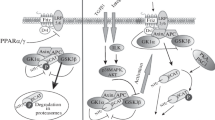Abstract
Glomerular mesangial cells play an important role in the development of glomerulosclerosis. Mesangial cell apoptosis has been shown to be involved in different stages of development of glomerulonephritis. The aim of the present study was to evaluate the effect of inhibition of serine/threonine phosphatases by okadaic acid, a shell fish toxin, on rat mesangial cell apoptosis and to examine the molecular mechanisms particularly the role of caspases. Okadaic acid significantly induced mesangial cell apoptosis, as measured by an increase in cytoplasmic nucleosome-associated DNA fragmentation. The induction of apoptosis was dependent on protein synthesis, because cyclohexamide, a protein synthesis inhibitor, blocked okadaic acid-induced apoptosis. In addition, okadaic acid stimulated caspase activities (as measured by caspase substrate peptide hydrolysis) in cultured rat mesangial cells at different time points. After 12 h treatment, okadaic acid caused a modest increase in caspase-8 (IETD-pNAse)(159.3 ± 6.7%) activity, while after 18 h treatment, okadaic acid caused a significant increase in caspase-3 (DEVD-pNAse)(906 ± 245%) activity. Okadaic acid-stimulated caspase-3 activity was inhibited by Z-IETD-FMK (caspase-8 inhibitor) suggesting that the caspase-3 activity is downstream of caspase-8 activity. Both caspase-3 and caspase-8 inhibitors blocked okadaic acid-stimulated apoptosis. These data suggest that inhibition of protein phosphatases by okadaic acid induces apoptosis in rat mesangial cells by activating caspase-3- and -8-like activities and that caspase-3-like activity is downstream of caspase-8-like activity.
Similar content being viewed by others
References
Klahr S, Schreiner G, Ichikawa I: The progression of renal disease. N Engl J Med 318: 1657-1666, 1988
el Nahas AM, Muchaneta-Kubara EC, Essawy M, Soylemezoglu O: Renal fibrosis: Insights into pathogenesis and treatment. Int J Biochem Cell Biol 29: 55-62, 1997
Baker AJ, Mooney A, Hughes J, Lombardi D, Johnson RJ, Savill J: Mesangial cell apoptosis: The major mechanism for resolution of glomerular hypercellularity in experimental mesangial proliferative nephritis. J Clin Invest 94: 2105-2116, 1994
Sugiyama H, Kashihara N, Makino H, Yamasaki Y, Ota A: Apoptosis in glomerular sclerosis. Kidney Int 49: 103-111, 1996
Cohen GM: Caspases: The executioners of apoptosis. Biochem J 326: 1-16, 1997
Villa P, Kaufmann SH, Earnshaw WC: Caspases and caspase inhibitors. Trends Biochem Sci 22: 388-393, 1997
Nagao M, Shima H, Nakayasu M, Sugimura T: Protein serine/threonine phosphatases as binding proteins for okadaic acid. Mutat Res 333: 173-179, 1995
Cohen P, Holmes CF, Tsukitani Y: Okadaic acid: A new probe for the study of cellular regulation. Trends Biochem Sci 15: 98-102, 1990
Fujiki H, Suganuma M: Tumor promotion by inhibitors of protein phosphatases 1 and 2A: The okadaic acid class of compounds. Adv Cancer Res 61: 143-194, 1993
Song Q, Baxter GD, Kovacs EM, Findik D, Lavin MF: Inhibition of apoptosis in human tumour cells by okadaic acid. J Cell Physiol 153: 550-556, 1992
Morimoto Y, Ohba T, Kobayashi S, Haneji T: The protein phosphatase inhibitors okadaic acid and calyculin A induce apoptosis in human osteoblastic cells. Exp Cell Res 230: 181-186, 1997
Li DW, Fass U, Huizar I, Spector A: Okadaic acid-induced lens epithelial cell apoptosis requires inhibition of phosphatase-1 and is associated with induction of gene expression including p53 and bax. Eur J Biochem 257: 351-361, 1998
Albrightson CR, Nambi P, Zabko-Potapovich B, Dytko G, Groom T: Effect of thrombin on proliferation, contraction and prostaglandin production of rat glomerular mesangial cells in culture. J Pharmacol Exp Ther 263: 404-412, 1992
Yue TL, Wang C, Romanic AM, Kikly K, Keller P, DeWolf WE Jr., Hart TK, Thomas HC, Storer B, Gu JL, Wang X, Feuerstein GZ: Staurosporine-induced apoptosis in cardiomyocytes: A potential role of caspase-3. J Mol Cell Cardiol 30: 495-507, 1998
Dimmeler S, Rippmann V, Weiland U, Haendeler J, Zeiher AM: Angiotensin II induces apoptosis of human endothelial cells. Protective effect of nitric oxide. Circ Res 81: 970-976, 1997
Ohta T, Kinoshita T, Naito M, Nozaki T, Masutani M, Tsuruo T, Miyajima A: Requirement of the caspase-3/CPP32 protease cascade for apoptotic death following cytokine deprivation in hematopoietic cells. J Biol Chem 272: 23111-23116, 1997
Kagaya S, Kitanaka C, Noguchi K, Mochizuki T, Sugiyama A, Asai A, Yasuhara N, Eguchi Y, Tsujimoto Y, Kuchino Y: A functional role for death proteases in s-myc-and c-myc-mediated apoptosis. Mol Cell Biol 17: 6736-6745, 1997
Kaushal GP, Singh AB, Shah SV: Identification of gene family of caspases in rat kidney and altered expression in ischemia-reperfusion injury. Am J Physiol 274: F587-F595, 1998
DiMari J, Megyesi J, Udvarhelyi N, Price P, Davis R, Safirstein R: Nacetyl cysteine ameliorates ischemic renal failure. Am J Physiol 272: F292-F298, 1997
Juo P, Kuo CJ, Reynolds SE, Konz RF, Raingeaud J, Davis RJ, Biemann HP, Blenis J: Fas activation of the p38 mitogen-activated protein kinase signalling pathway requires ICE/CED-3 family proteases. Mol Cell Biol 17: 24-35, 1997
Parameswaran N, Nambi P, Hall CS, Brooks DP, Spielman WS: Adrenomedullin decreases extracellular signal-regulated kinase activity through an increase in protein phosphatase-2A activity in mesangial cells. Eur J Pharmacol 388: 133-138, 2000
Author information
Authors and Affiliations
Rights and permissions
About this article
Cite this article
Parameswaran, N., Spielman, W.S., Brooks, D.P. et al. Okadaic acid stimulates caspase-like activities and induces apoptosis of cultured rat mesangial cells. Mol Cell Biochem 260, 7–11 (2004). https://doi.org/10.1023/B:MCBI.0000026041.41078.32
Issue Date:
DOI: https://doi.org/10.1023/B:MCBI.0000026041.41078.32




